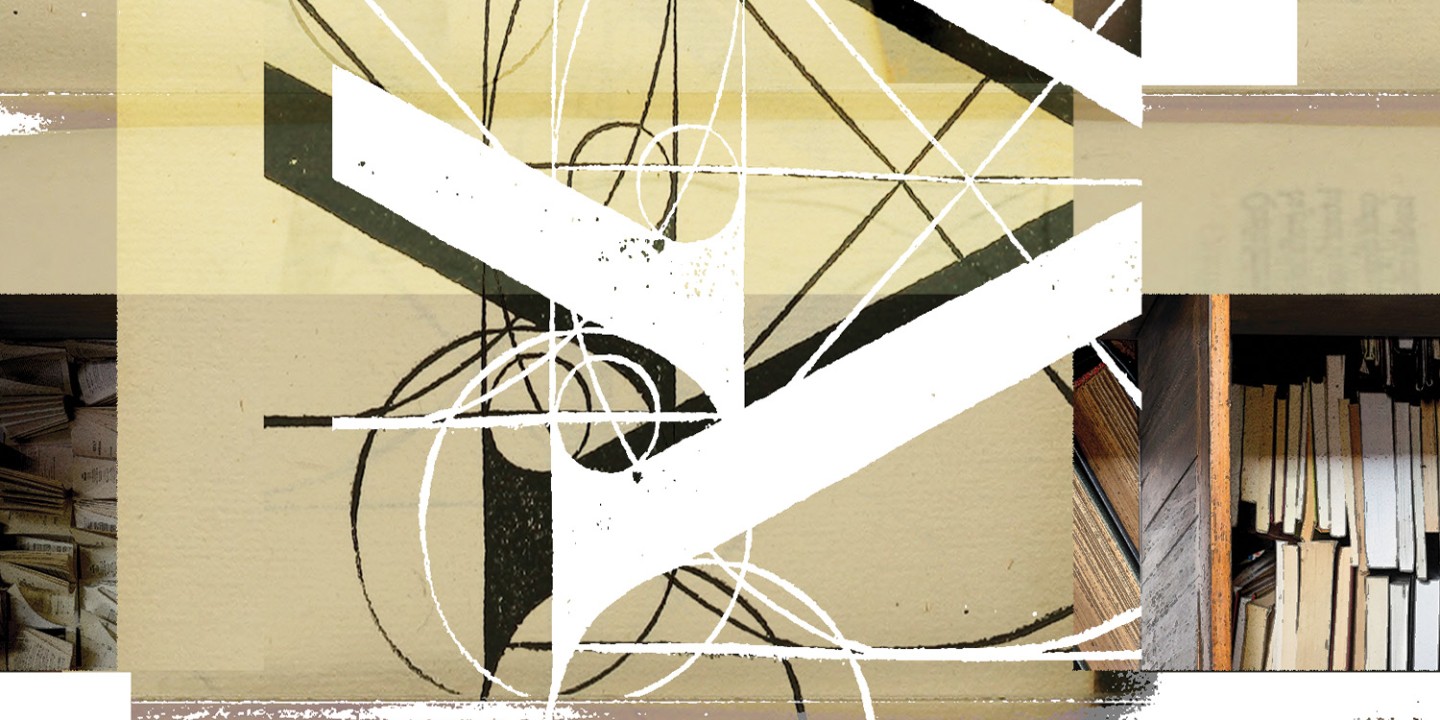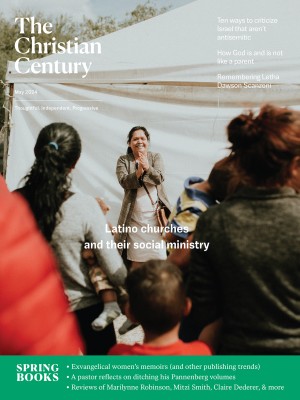My bookshelf at the end
Packing up my library, I decided to let go of my Wolfhart Pannenberg books—and the wounds they represent.

(Century illustration)
“So, are you keeping any Pannenberg?”
“No,” I said after a pause so long my friend wondered if I had heard him. “Sorry, Wolfhart.”
He had come to the office to help me sort and pack for my next move, which I hoped would be my last: from a big parsonage to a little house of my own. In short, into retirement. Only a very few of my books would make the trip with me.
My days of active vocational ministry were ending. I wanted to be done with distractions and “maybe one days,” in the spirit of Oliver Wendell Holmes Sr., who said, “For the simplicity on this side of complexity, I wouldn’t give you a fig. But for the simplicity on the other side of complexity, for that I would give you anything I have.”
“Why on earth did you buy so many books in the first place?” It was a question I had heard before. Often.
The hard-won answer: because each title I bought, in whatever area, promised knowledge and wisdom, insight and applicability. Each glowing blurb spoke to my glaring inadequacies as a pastor. Between these covers, in black and white, were successful techniques to renew, restore, redirect, and revive moribund congregations. And preachers. This book or that series would grant me effectiveness in my setting, something I knew I lacked—and if I doubted it, here were testimonies to prove it.
Read our latest issue or browse back issues.
Each trip to Cokesbury felt like another hopeful pilgrimage to Delphi, a glad journey to Zion for instruction. I visited every section, crooking my neck till it ached, to peruse every title. I always went home with books that I hoped would teach me what everyone else seemed to know already.
I studied every seasonal catalog that came, unsolicited, to my mailbox. Later, on Amazon, I would follow the links and suggestions of many well-known experts I had never heard of. But maybe that was the point. Maybe I was foundering because I was so ignorant of the latest strategies for conflict management, the newest best practices for church growth, and the way to remove anxiety from stewardship season.
And why did I keep so many books?
It’s a fair question, and I have actually spent considerable time thinking about it.
Was I a hoarder? Guilty of tsundoku—the Japanese word for accumulating books and never reading them? The thought had occurred to me; vague anxieties tending to panic had long thwarted my attempts to divest. More than once, as I cradled a dusty volume in my hands, perhaps unopened since seminary, I found I could not bear to part with it. “I might need this at some point,” I had satisfied myself regarding Claus Westermann’s Essays on Old Testament Hermeneutics. But no. Not really.
My practice was not pathological, however—more like aspirational. First of all, the books looked good on the shelf (most of them, anyway), and they looked good on me. My library was impressive, and in those early days I was going for effect, much as I did with a pipe and a leather-elbowed tweed jacket. My overstuffed shelves gave the temporary impression to (at least some) others that I was both smart and well-read, though I and (at least some) others knew better.
But whatever anyone thought, I liked taking my place, literally, in the midst of my elders and betters. I was 12 years old, in my own little temple, surrounded by the teachers of the law. Which is the second reason: I liked to pretend I belonged in those ongoing conversations.
The shelves were like the walls of a fortress when I felt vulnerable to attack. As long as I was at my desk, I had powerful allies.
My answer to the Pannenberg question was so long in coming because the mere mention of the theologian’s name had suddenly swamped me in brackish recollections of my life long ago.
Pannenberg was a powerful voice for God’s eschatological victory and also, to my ear, a synecdoche of my humiliating failures: an aborted PhD, exile from my cradle denomination, bitter isolations from family and friends, a painful divorce and the first of two wilderness exiles, the anger of my committee chair, himself a Pannenberg scholar, which estranged us completely and permanently, though I made many overtures over long decades to be forgiven by and reconciled to him.
In a swift stroke I lost my people and my stories, my places of origin and my vocational aspirations. Resentments, like bitter herbs, were sop for the bread of my degradation.
A tough counselor started cleaning my wounds, and not tenderly. Splints, stitches, and stinging salves addressed the most obvious injuries, but anything like real healing would take decades and many more counselors. In fact, some of the deepest traumas, if I work to touch them, remain quite tender to this day, so I mostly leave them alone. Some of my breaks were never reset and never reknitted, or they healed only crookedly. My limp, these days, is less pronounced than it was, but now and then I instinctively pivot to protect those painful dislocations.
About all I remember of Pannenberg is his conviction that only at the end is everything finally put to right. In fact, he said, even the very existence of God is a matter of when, not if. Since the existence of God cannot be separated from God’s loving rule of the world, and since that loving rule is not yet in evidence even to the eyes of faith, in a real but qualified way we have to say that God does not yet exist. Soon, though, God’s loving rule will be visible to all, and we will be able to see that God does exist. Looking back from the vantage of then, we will see that God always saw.
Gobbledygook? Not to me. In fact, that curious piece of theology has proved quite comforting through all my wilderness moments. In many seasons of my life I have felt godforsaken. Looking back, though, God was in the land and I just didn’t know it—present if unnoticed; sitting with me, if silent; patiently tending to my anxious soul.
Actual ruin, after all, happens in a moment, is centrifugal, and leaves one at stunned distance from people, places, stories, and faith. Healing, if it occurs, takes much longer, is centripetal and may include other people, other places, and other stories.
How can one sing the Lord’s song in that strange new land? Only when one comes to believe that the place and the land are not strange to God, and that a new story is being written in service to an old song. The roads to disaster may be many and crowded, but there is one path to healing, and it is narrow and rough. Only later can you see that there was room also for God.
Redemption is often a solitary business. Tragedy that begins in the context of community ends in isolation, while restoration that begins in utter isolation will, if it is genuine, come out of the wilderness to take its redefined place among people. And only at the end does everyone and everything take its proper place.
Pannenberg’s theology had always seemed to me equal parts hope and despair. The several dusty volumes on my shelves bearing his name, likewise. I bought his every translated title—and one J-term, worked almost without sleep to read his every word of eschatological expectation—and engaged him in much the same way I would come to buy most all the books I ever acquired: with great anticipation that ended in greater disappointment.
Now, the reverse was in play: I discarded the books with anticipation and knew I would not be disappointed to narrow my focus. It was time to stop carrying these old hurts around.
I reached out to my old adviser some years ago, continuing to search for that elusive reconciliation. I’d found him on Facebook, a full 45 years after the breach. When I messaged him and once more he did not reply, I simply took that for his continuing disdain. Some weeks later, though, by chance, I learned that by the time I sent that last message, he had been dead for a few years already. Till the eschaton, then, Frank.





